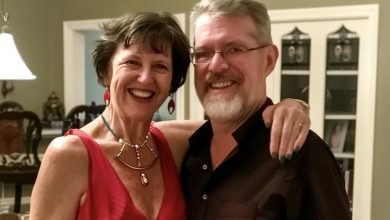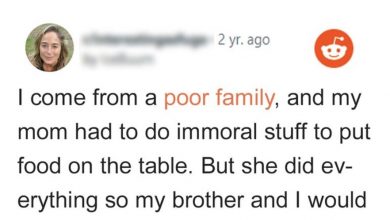From “Policy Violation” to Payback: The Manager Who Lost to Karma

I grew up watching my mom, Cathy, pour her heart into Beller’s Bakery. For eighteen years, she was the “Cookie Lady” of our small town—always there before dawn, greeting everyone with a warm “Good morning, sugar,” and sending them off with a fresh pastry and a smile. No matter how cold it was or how late she’d worked, her apron was always dusted with flour and her spirit never wavered.
Then one rainy night changed everything.
My name is Kevin, and by then I was just eighteen, halfway through college, living on ramen and part-time jobs. I’d called Mom that evening—she sounded chipper as ever—but told me she’d be late closing up because of the storm. I shrugged it off. She could handle a little rain.
About ten minutes before she planned to lock the doors, a soaked man in his sixties—wearing military dog tags—shuffled in. Mom saw him shiver, took off her own dry towel, and handed it to him. Then, without hesitation, she packed up two leftover muffins and half a loaf of bread—food destined for the trash—and pressed it into his hands. He looked like he might cry. He thanked her and disappeared into the storm.
The next morning, Mom never made it past the counter.
Her new manager, Derek—fresh out of some corporate training program—was waiting. He wore crisp shoes and a shiny name tag; I still remember the smug tilt of his head.
“Heard what you did last night,” he said, arms folded.
Mom blinked and tried to explain, “It was just food going to waste. He needed it.”
But Derek cut her off. “Company policy: no giving away products. That’s theft. You’re fired.”
I heard her keys jingle as she unlocked the front door on her way home, still wearing that flour-spattered apron. Tears streamed down her face. I sat her at our kitchen table and she tried to brush it off—said she’d find something else, that it was okay—but I could see how much it hurt.
That moment stayed with me. I remembered her gentle laugh, her big heart, and how helpless she’d felt standing outside the only place she’d ever called home for nearly two decades.
Ten years went by. After graduation I started a food-tech company that teams up with bakeries, restaurants, and grocery stores to rescue surplus food and deliver it to local shelters. What once seemed impossible—turning waste into meals—became our mission. I called it “Second Slice,” and it grew fast.
We began hiring. Our small office buzzed with spreadsheets, delivery schedules, and volunteer sign-ups. One afternoon, I sat behind my desk, scrolling through applications for an operations manager—the person who would coordinate pickups and oversee our volunteer drivers.
That’s when I saw the name: Derek Mallory.
Same last name as Mom’s old manager. Same polished photo—slick suit, tight smile. My heart stuttered. Could it be the same Derek who’d thrown Mom out for her kindness? I sat back, replaying her story in my head. A man who punished generosity over a few muffins—what would he make of our work?
Surely he didn’t recognize me. I’d changed—cut my hair, swapped the high school face for a beard—but the memory of his smirk burned clear in my mind.
Still, I did what every CEO does: I scheduled the interview.
He arrived promptly the following Monday. The lobby’s glass doors clicked behind him, and he walked in with that same confident stride. He shook my hand firmly, introducing himself as “Derek Mallory, operations specialist.” His voice oozed that practiced charm.
We sat down in the conference room—rows of chairs, a whiteboard listing our key pickup locations, stacks of delivery logs. I offered him water; he accepted, saying he’d heard good things about our mission.
“Your resume is impressive,” I began. “You’ve worked in various retail management roles. I’m curious: tell me about a time you had to make a tough call on company policy.”
His eyes glinted. “Back at the bakery I once managed, an employee gave away unsold pastries at closing. Inventory loss meant financial hit. I let her go on the spot—no exceptions. Rules are rules.”
He leaned back, pleased with himself. “Sentiment doesn’t pay the bills.”
There it was. The same voice, the same posture as that rainy night ten years ago.
I held his gaze. “Which bakery was that?”
His face flickered for a split second—confusion, maybe fear. “Uhh… Beller’s Bakery.”
My heart pounded. I forced a small, polite smile. “Interesting. Beller’s is where my mom worked for eighteen years until she was let go under the same policy. In fact, it was two leftover muffins and some bread rolls that she gave away to a homeless veteran on a stormy night.”
Derek’s eyes widened. His smooth confidence crumbled. “I… I didn’t know.”
I shook my head gently. “You did. You were the manager who fired her.”
Silence fell like dust in a deserted warehouse.
He stammered excuses—talked about policy manuals, corporate directives—but I cut him off. “I’m sorry, but we can’t have someone here who punishes charity,” I said softly. “Your actions that day cost a good woman her job. And I’ve spent the last decade building something based on the very kindness you rejected.”
Derek stood, rushed out of the room without a word, like a child caught in a lie.
I let the door close behind him, the click echoing in the empty hallway. The weight I’d carried—watching my mother lose her livelihood for helping someone—felt lighter. I’d given karma a chance to catch up, not in anger, but by building something better.
That evening, I called Mom.
“Guess who applied for my operations manager role?” I asked.
She laughed, soft and proud. “Not Derek?”
I grinned. “The very same.”
Her voice cracked with emotion. “I’m so proud of you.”
“Not proud for me,” I said. “Proud for you—because your compassion inspired all of this.”
She paused, then asked quietly, “So what happened?”
“I gave him a chance to explain, and then I showed him what true impact looks like. He left, and I turned down his application.”
Her sigh was a mix of relief and vindication. “You did right.”
Even now, our volunteers make pickups at the old bakery on Main Street. They collect unsold loaves, pastries, muffins—food once bound for the trash—and deliver them to homeless shelters and community centers. I still remember Mom’s flour-dusted apron and her gentle smile as she handed those two muffins to that shaken veteran.
I also remember Derek’s lecturing tone, his rigid rule-book mind that refused kindness.
Karma isn’t an angry judge. It’s the simple balance of life: the good we put into the world often finds its way back. My mom’s act of generosity became the seed for a company that’s now feeding thousands each week. And the man who punished her for showing compassion? He met his moment in my office, forced to face the consequences of valuing policy over people.
I don’t know where Derek is now. Maybe he found work at another bakery, still clutching those rule books. But here, at Second Slice, we keep Mom’s legacy alive, every day, one rescued loaf at a time.
And that, to me, is the sweetest kind of justice.










